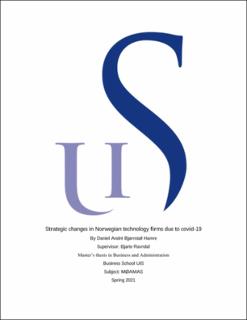| dc.description.abstract | The theme for this thesis is digitalization because of covid-19 in the technology sector. Digitalization is used about the process towards a more digital world and means that new technology is used and changes the businesses with the aim of seizing new value-creating opportunities. According to several researchers, it is therefore strategy, and not technology, that drives digital transformation. Digitalization is expected to have a particularly large effect on the technology industry, as digital solutions is mainly thought to come from this sector. How covid-19 has affected society is still uncertain, and a large proportion of the research literature in the area consists of conceptual articles that only speculate on how covid-19 has contributed to digitalization. Furthermore, research on covid-19 is mainly focused on the implications for the education sector and the healthcare sector. Thus, there is limited research on how the pandemic has affected the technology companies and what implications this will have regarding digitalization. The master's thesis helps to close this research gap through the following research question: “Which strategic assessments do technology firms make regarding digitalization due to covid-19, and why?” To understand the firms’ strategic assessments, relevant literature in the field of strategy, institutional theory, and social capital will provide the theoretical framework for the thesis. Furthermore, it has also been chosen to include theory about psychological contracts and research literature that sheds light on the social dimension of the technology sector. To answer the research question, a qualitative approach with a phenomenological research design has been used. The sample has consisted of three informants in the top management of small and medium-sized (SMEs) technology companies located in different parts of the country that mainly have customers in the B2B market. Additionally, informants from top management in three large established technology companies that serve customers in both the B2B market, and the private market were used to get access to data that can be used on the technology sector for transferable results, which in turn can be utilized in future studies of the technology sector. Primary data were collected through six semi-structured interviews, where all the interviews were conducted through video conferences. The quality of the analysis is discussed based on the concepts of reliability, validity, and ethics.
An important finding is that few of the companies, by definition, have a formalized strategy regarding digitalization. Nevertheless, the large established companies have a conscious relationship with digitalization and have largely incorporated the ideas regarding digital solutions into their overall strategy. Furthermore, SMEs in the technology sector have employees with high competence (human capital), and even though they do not have a formalized digital strategy, the organization within the company have clear expectations of what is to be done and not in terms of digitalization. Therefore, the empirical data in the study suggest that SMEs use a reactive strategic approach to digitalization, while large established companies use an active strategic approach. The SME's approach does not necessarily correspond to a passive attitude towards digitalization and is referred to in the literature as a strategy under the name "Active Wating".
Consequently, the study concludes that there have been some significant changes in the technology sector because of covid-19. First and foremost, the technology sector has had a revolution when it comes to communication across time and distances because of utilization of video conference, which has reduced traveling expenses and more efficient work conditions. Furthermore, the work force in both SMEs and large established firms have adopted digital tools and systems in their daily work life, which in turn has been adapted because of covid-19. This is believed to continue as the society opens again, but with more of a hybrid solution with some physical meetings. Thus, the technology sectors approach to digitalization has changed because of covid-19. Secondly, firms in the technology sector have had an increase in customer leads because of the pandemic, which in turn has given them more to do, and several firms is thinking on expanding (both SMEs and large established firms). | |
